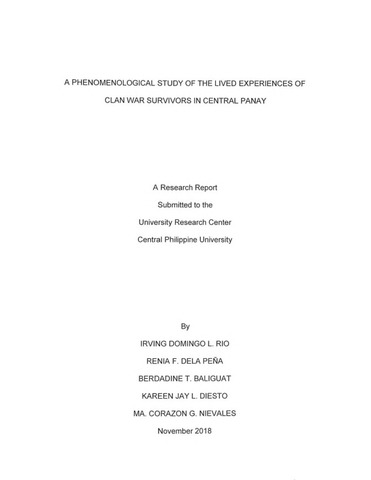Показать сокращенную информацию
A phenomenological study of the lived experiences of clan war survivors in Central Panay
| dc.contributor.author | Rio, Irving Domingo | |
| dc.contributor.author | Dela Peña, Renia F. | |
| dc.contributor.author | Diesto, Kareen Jay L. | |
| dc.contributor.author | Nievales, Ma. Corazon G. | |
| dc.contributor.author | Baliguat, Bernadine T. | |
| dc.date.accessioned | 2021-11-05T01:03:03Z | |
| dc.date.available | 2021-11-05T01:03:03Z | |
| dc.date.issued | 2018-11 | |
| dc.identifier.citation | Rio, I. D. L. , Dela Peña, R. F. , Diesto, K. J. L. , Nievales, M. C. G. , & Baliguat, B. T. (2018). A phenomenological study of the lived experiences of clan war survivors in Central Panay (Research report). Jaro, Iloilo City: University Research Center, Central Philippine University. | en_US |
| dc.identifier.uri | https://hdl.handle.net/20.500.12852/1648 | |
| dc.description | Abstract only Digital copy only | en_US |
| dc.description.abstract | In remote villages in Central Panay (Philippines), the presence of government institutions is not yet institutionalized and some traditional practices are still dominant in their way of life. Vengeance is still viewed by many Panay-Bukidnon people as an instrument in seeking justice and this is collectively pursued by the clan or the whole village. Thus, this study sought to understand and explore the lived experiences of those who actually experienced and survived a three-year long clan was between two villages in the Province of Antique, Philippines. Five survivors were chosen using criterion sampling, and the researchers used qualitative phenomenological research method and utilized face-to-face unstructured interview and observations. Most of the participants are still in disbelief in being alive and because of the extent of brutality of the clan war, they have rationalized vengeance and the necessity to braved in order to survive the ordeal. Most of those who fled to the forest during the first massacre have narrated their experiences with sufferings, hunger and hardship just to survive. Their sad experiences gave them the wisdom to settle future disputes peacefully and with open heart in order to avoid another clan war were there are no winners, but only losers. The lived experiences of clan war survivors will serve as a basis for enhancing indigenous conflict resolution with the active participation of the local government units, non-government organizations and the national Commission on indigenous people (NCIP) and re-evaluate the current Indigenous Peoples’ Right Act and the Local Government Code of the Philippines and harmonize some conflicting provisions. | en_US |
| dc.description.sponsorship | Central Philippine University | en_US |
| dc.format.extent | vii, 68 leaves | en_US |
| dc.language.iso | en | en_US |
| dc.subject.lcsh | Indigenous peoples | en_US |
| dc.subject.lcsh | Indigenous peoples--Legal status, laws, etc. | en_US |
| dc.subject.lcsh | Indigenous peoples--Social life and customs | en_US |
| dc.subject.lcsh | Revenge | en_US |
| dc.subject.lcsh | War | en_US |
| dc.subject.lcsh | Conflict management | en_US |
| dc.subject.lcsh | Phenomenology | en_US |
| dc.subject.lcsh | Massacre survivors | en_US |
| dc.subject.lcsh | Justice, Administration of | en_US |
| dc.subject.lcsh | Philippines--Panay Island | en_US |
| dc.title | A phenomenological study of the lived experiences of clan war survivors in Central Panay | en_US |
| dc.type | Technical Report | en_US |
| dcterms.accessRights | Limited public access | en_US |
| dc.description.bibliographicalreferences | Includes bibliographical references | en_US |
| local.subject | Lived experiences | en_US |
| local.subject | Clan war survivors | en_US |
| local.subject | Indigenous people | en_US |
| local.subject | Collective vengeance | en_US |
| local.subject | Central Panay | en_US |
| local.relation.associatedcontent | https://repository.cpu.edu.ph/handle/20.500.12852/1331 Paper published in the Turkish Online Journal of Qualitative Inquiry | en_US |
Файлы в этом документе
Данный элемент включен в следующие коллекции
-
Research reports [167]


